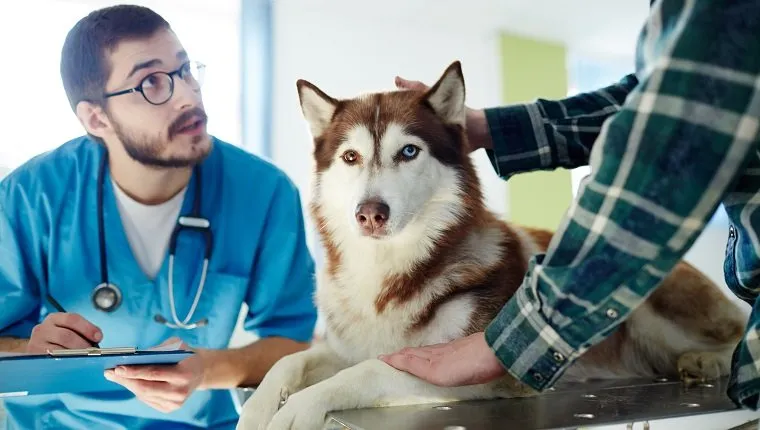
Liver disease in dogs, known as “hepatobiliary disease,” affects one of the most important organs in the body. The liver filters toxins out of the blood, aids in digestion, metabolizes sources of energy, and creates proteins needed for blood clotting, among other functions.
Liver disease can be caused by a lot of factors. For example, genetics, exposure to toxic substances or drugs, infections, cancer, and trauma can be causes. Furthermore, it often leads to an irreversible buildup of scar tissue known as cirrhosis.
Because the liver is important to so many functions in dogs’ bodies, diseases that affect the organ can be fatal, especially if left untreated. If you see symptoms in your dog, talk to your veterinarian so they can form a proper diagnosis, find the cause, and begin treatment.
Here’s what you should know about the symptoms, causes, and treatments for liver disease in dogs.
Symptoms Of Liver Disease In Dogs

Symptoms of liver disease in dogs vary based on how severe the condition is and the cause of the illness. Symptoms also depend on which of the liver’s functions are compromised.
Some affected dogs may show no signs at all, especially in the early stages. Also, the symptoms that do appear can vary widely and often mimic the signs of other diseases.
Here are a few of the fairly common symptoms of liver disease in dogs:
- Loss of appetite
- Weight loss
- Nausea and vomiting
- Lethargy
- Weakness
- Diarrhea
- Dehydration
- Increased thirst or urination
- Blood in stool or urine
- Unhealthy coat
- Distended abdomen (ascites)
- Unsteady walk
- Confusion
- Jaundice
- Seizures
- Blindness
- Personality changes
- Collapse
- Coma
Causes Of Liver Disease In Dogs

There are several possible causes of liver disease in dogs. It can also result as a normal process of aging. However, the cause may be completely unknown in some cases.
Usually the liver is a fairly resilient organ, and as much as 70 to 80 percent of liver tissue must be destroyed for liver failure to occur. However, liver disease can easily become deadly if certain body functions are affected, and repeated exposure to liver disease worsens the risk of cirrhosis and liver failure.
Here are some possible causes of liver disease in dogs:
- Ingestion of toxic chemicals (pesticides, household cleaners, antifreeze, etc.)
- Eating toxic plants or foods (poison mushrooms, lilies, etc.)
- Exposure to certain drugs, particularly long-term exposure (NSAIDS, antibiotics, corticosteroids, diuretics, and more)
- Contact with mold
- Infections
- Diabetes
- Cushing’s disease
- Hypothyroidism
- Cancer
- Liver cysts
- Hepatitis
- Liver shunts
- Pancreatitis
- Gall bladder stones
- Fibrosis of the liver
- Liver abscess
- Injury or trauma
Treatments For Liver Disease In Dogs

Treatment for liver disease in dogs depends on the cause, the severity of the condition, the extent of liver damage, and how early the disease is found. However, for most cases, vets advise dietary changes and supplements. Liver-friendly diets are usually high in digestible protein and low in sodium.
Vets often prescribe medications to treat the disease. They may use anti-inflammatory and immunosuppressive drugs, especially certain kinds of steroids.
They may also prescribe other drugs to manage symptoms, including anti-emetics to prevent vomiting and gastrointestinal medications to help with ulcers and bleeding. Surgery may also be an option for dogs who suffer from tumors or cysts.
There are many forms of treatment to address the causes of liver disease. Your vet will work to determine the cause and prescribe treatment. Treatment works best when the disease is caught early, so talk to your vet at the first sign of symptoms.
Has your dog ever suffered from liver disease? What was the cause? Let us know in the comments below!









